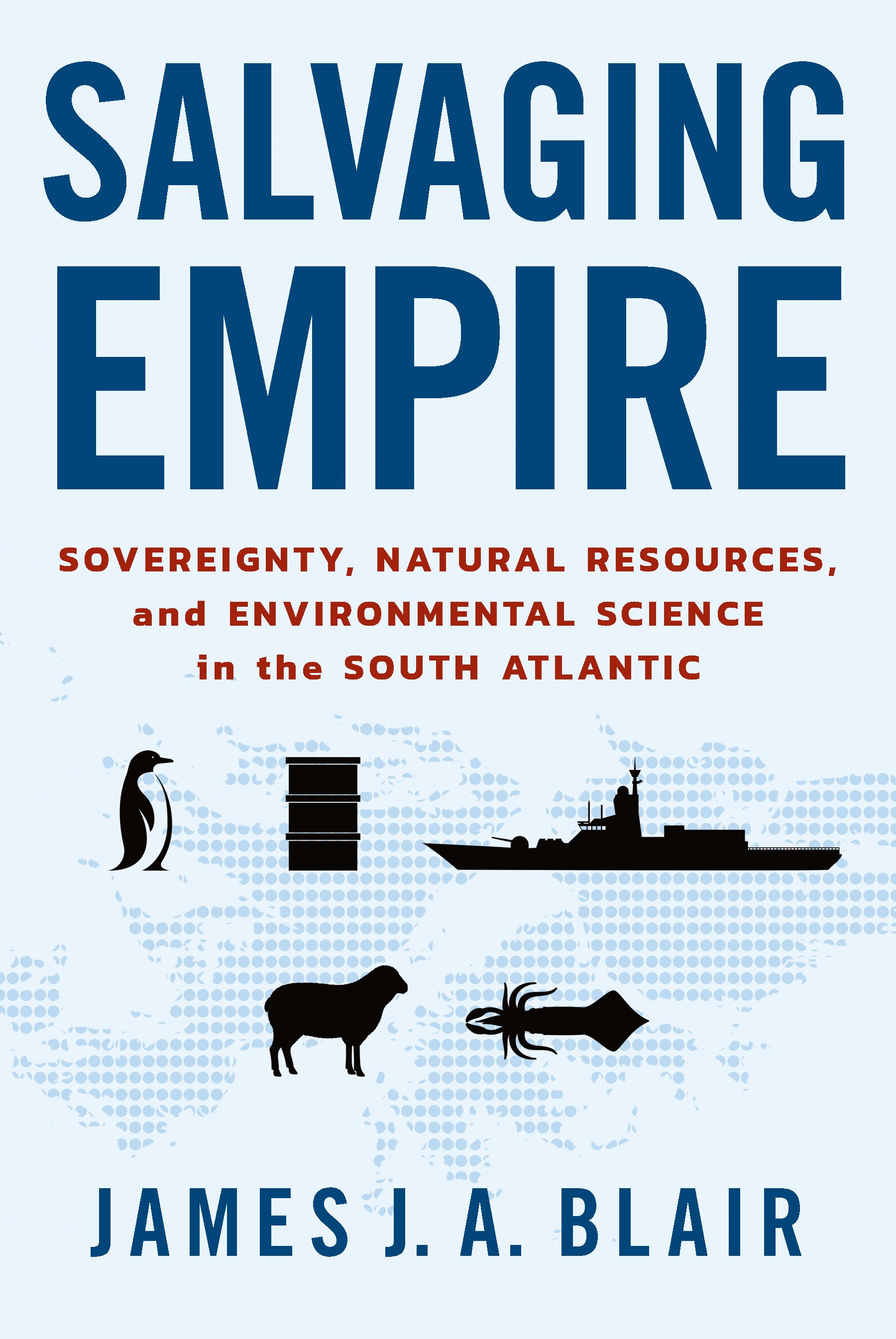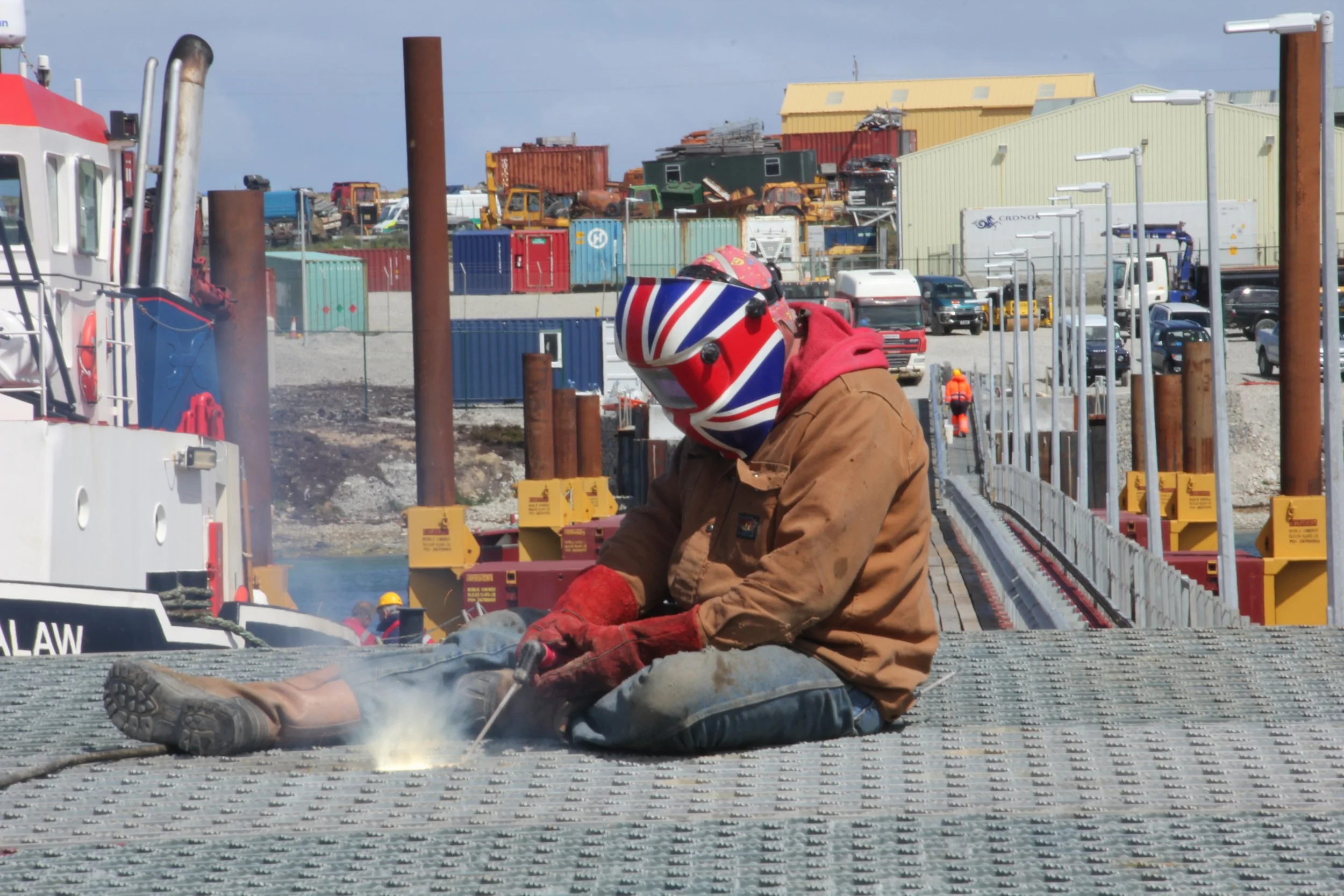
Salvaging Empire probes the historical roots and current predicaments of a twenty-first century settler colony seeking to control an uncertain future through resource management and environmental science. Four decades after a violent 1982 war between the United Kingdom and Argentina reestablished British authority over the Falkland Islands (Las Malvinas in Spanish), a commercial fishing boom and offshore oil discoveries have intensified the sovereignty dispute over the South Atlantic archipelago. Scholarly literature on the South Atlantic focuses primarily on military history of the 1982 conflict. However, contested claims over natural resources have now made this disputed territory a critical site for examining the wider relationship between imperial sovereignty and environmental governance. James J. A. Blair argues that by claiming self-determination and consenting to British sovereignty, the Falkland Islanders have crafted a settler colonial protectorate to extract resources and extend empire in the South Atlantic. Responding to current debates in environmental anthropology, critical geography, Atlantic history, political ecology, and science and technology studies, Blair describes how settlers have asserted indigeneity in dynamic relation with the environment. Salvaging Empire uncovers the South Atlantic's outsized importance for understanding the broader implications of resource management and environmental science for the geopolitics of empire.
“An innovative, engaging, and insightful book. Investigating the political, socioeconomic, environmental, and technoscientific issues shaping the Falkland Islands as part of a larger South Atlantic world that includes Argentina and the British Commonwealth, it expands our understanding of South Atlantic geopolitics and global frontiers of empire.”
“Salvaging Empire is an engaging analysis of the construction of political identity in the Falkland Islands through oil development, biodiversity management, and science and immigration policies. James Blair provides a welcome shift in perspective by focusing not on war or diplomatic history between nation-states but on islanders themselves.”
“Salvaging Empire is an in-depth study of the Falkland Islands approached from various angles. Each chapter elegantly and convincingly employs a different approach, ranging from anthropology to environmental science and colonial studies. Readers get the impression that Blair wrote this book while standing among the Falklanders, making it equally fascinating for those interested in this extraordinary location and those intrigued by environmental and colonial history. Despite its complex topic and wide variety of approaches, the language and mix of descriptive narration of episodes and reflective discussion of consequences make it a joy to read. Whether a seasoned scholar or a casual enthusiast, one will find oneself captivated by the intricacies of Falkland history and the broader implications of empire in the modern world.”
“Blair makes a compelling series of arguments that demonstrate the importance of the Falkland Islands to our understanding of imperial history and the imperial present. Beyond its self-evident value for scholars interested in the South Atlantic, Salvaging Empire offers a fascinating case study for scholars of imperial identity formation, especially within the British Empire ... Beyond its relevance to British imperial history, Salvaging Empire also makes an important contribution to scholarship on environmentalism, sovereignty, and resource frontiers. ”
“Salvaging Empire is an excellent history of the Falkland islands and their industries over the decades. Blair does an excellent job of demonstrating how interconnected everything is in today’s world, from global corporations to the impact countries may have on one another simply by not allowing shipping containers from another country to cross their borders.”
Chapter Summary
-

Part 1: Dispossession
Drawing on colonial letters, diaries, and ordinances as well as interviews with descendants of early settlers in Part 1, the first chapter outlines the history of settlement and the movement of people between the islands and Patagonia. A cattle frontier built on conditions of debt peonage resulted in the alienation and exile of South American gauchos after permanent British occupation. Addressing the legacy of a fraught missionary settlement in the Falklands, the chapter revisits the story of the Indigenous Yagán figure O’rundel’lico (also known as James “Jemmy” Button). The second chapter analyzes how islanders have adhered to and customized British imperial property ideologies of enclosure and improvement of the commons. It describes how the Falklands’ property regime has transformed land tenure from a usufruct colony founded on debt bondage to an absentee-owned monopoly of community sheep ranches and the current system of privatized small family farms. Chapter 3 then analyzes social contradictions inherent to the colonial subjection of settlers and the islanders’ assertion of peoplehood. It traces the local construction of a white ethnic community: locally born “kelpers.” It then describes how, since the 1982 war, Falklands society has become an imperial diasporic mixture of islanders, British contractors, and military personnel as well as migrants. Despite apparent multiculturalism, citizenship remains contingent on degrees of imperial sovereignty, and strict immigration laws and customs restrict access to the “Falklands Way of Life.”
Image Credit: : O’rundel’lico (also known as James “Jemmy” Button) in 1834 (left) and 1833 (right). Reproduced with permission from John van Wyhe (ed.). The complete work of Charles Darwin online, 2002 (available online: http://darwin-online.org.uk/). Source: FitzRoy, R. 1839. Proceedings of the second expedition, 1831-36, under the command of Captain Robert Fitz-Roy, R.N. London: Henry Colburn.
-
Part 2: Wreckage
Shifting to environmental wreckage in Part 2, chapter 4 describes how the islanders have built upon past extractive economies to craft new resource regimes. It relates speculation surrounding plans to develop the Sea Lion oil field with past strategies to capture wealth by salvaging shipwrecks, sealing, whaling, penguining, and commercial fishing. As hopes rise for an oil bonanza, local visions of becoming a commercial energy exporter threaten to eclipse previously established modes of resource production. The fifth chapter examines how islanders have used infrastructure as a means of resolving the temporal paradox between retrospective peoplehood built on a shared past and prospective personhood constituted in an uncertain future of oil production. It pays particular attention to the construction of the aptly named “Noble Frontier” temporary dock facility, built to accommodate oil exploration, as it relates to mired plans for a permanent deepwater port. It then examines shifting debates over the engineering design of the Sea Lion drill site. By attending to the incremental process of oil development, the chapter throws new light onto not only petro-capitalism but also settler colonialism, which tends to emphasize durable structures over infrastructural events.
-

Part 3: Survival
In Part 3, chapter 6 analyzes the enclosure of the South Atlantic as a knowledge frontier. It examines how the UK and Argentina secure their respective claims to resource-rich maritime territory through scientific research. Centering on the Data Gap project, financed jointly by the Falkland Islands Government (FIG) and its offshore oil licensees, the chapter describes how marine ecologists tag penguins with tracking sensors and curate their data as part of a new geographic inventory of the South Atlantic. Data representing the penguins’ foraging patterns feed into environmental impact assessments and are intended to influence where oil firms plan to locate drilling and fuel transfer sites, but transparency measures serve geopolitical and corporate interests at the possible risk of local ecological damage. Finally, toward a theory of settler indigeneity, the final chapter examines quotidian practices to ensure biosecurity and preserve biodiversity. It discusses the implications of Charles Darwin’s cross species comparisons during his voyage of the Beagle and then tracks how the historical disgust that Darwin and early settlers felt toward Yagán Natives of Tierra del Fuego influenced the desire to expel nonhuman bodies and objects in various eradication campaigns. Blair contends that by “colonizing” with native species in ecological restoration projects, settlers aim paradoxically to assert indigeneity while salvaging British heritage.
30% OFF
-
30% OFF -
Salvaging Empire: Sovereignty, Natural Resources, and Environmental Science in the South Atlantic
ENTER CODE: 09BCARD


